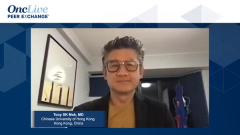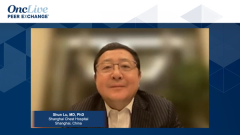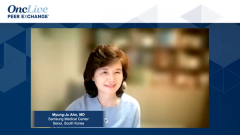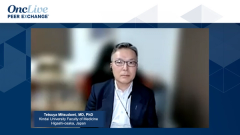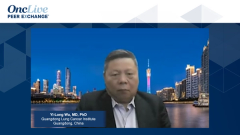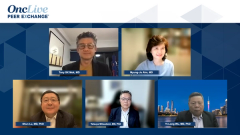
EGFR+ Advanced NSCLC: Molecular Testing in Patients Resistant to Frontline TKIs
Following treatment failure on frontline TKIs in EGFR+ advanced NSCLC, experts consider biomarker testing to inform second-line treatment.
Episodes in this series

Transcript:
Tony S.K. Mok, MD: Now we have already talked about a few different combinations of chemotherapy with bevacizumab. Let’s move into resistancy. Let’s first talk about the testing for resistancy. Patients with first-generation [disease], it’s easy to just go for the T790M IL [interleukin] testing, but what about osimertinib first-line failure? What would be your routine testing on a patient who failed osimertinib? Tetsuya?
Tetsuya Mitsudomi, MD, PhD: In Japan, without the research purposes, we do not do the testing after the osimertinib area.
Tony S.K. Mok, MD: In China, Lu Shun?
Shun Lu, MD, PhD: [In clinical] practice, we are not routinely using the NGS2 [next-generation sequencing] test of EGFR resistance. Still we select the patients to test based on the c-MET high verification. Right now, we have MET TKI [tyrosine kinase inhibitor]. We will select the patient to use in the combination. Although there are no randomized phase 3 studies to show the positive results, but still there are some patients who don’t like receiving the chemotherapy or something. Or even after the chemotherapy we will use this.
Tony S.K. Mok, MD: OK, and Yi-Long, would you do routine testing of the osimertinib resistance?
Yi-Long Wu, MD, PhD: In clinical practice generally we don’t give the recommendation for the test of osimertinib resistance using NGS or [INAUDIBLE], but in my clinical practice, almost 80% of patients receive liquid biopsy. To test that they use NGS. I want to know what is the mechanism for the osimertinib resistance. So in my patients we are looking to divide the patient to the on target resistant, or the off target resistant, or the translocate the small cell lung cancer. Because this is different—the mechanism—we have the different treatment strategies. So in clinical practice a routine test, the osimertinib [is given] for the failure patient.
Tony S.K. Mok, MD: Myung-Ju, in Korea?
Myung-Ju Ahn, MD: Even though osimertinib is not reimbursed as a first-line [treatment] in a patient who received the osimertinib as a first line and then progress, I do routinely do the repeat biopsy because 10% to 15% of patients have their histological transformation, like small cell and squamous. So that’s 1 reason. The other reason is that it encourages the patient to participate in clinical trials. So I do the NGS [testing], yes.
Transcript edited for clarity.


